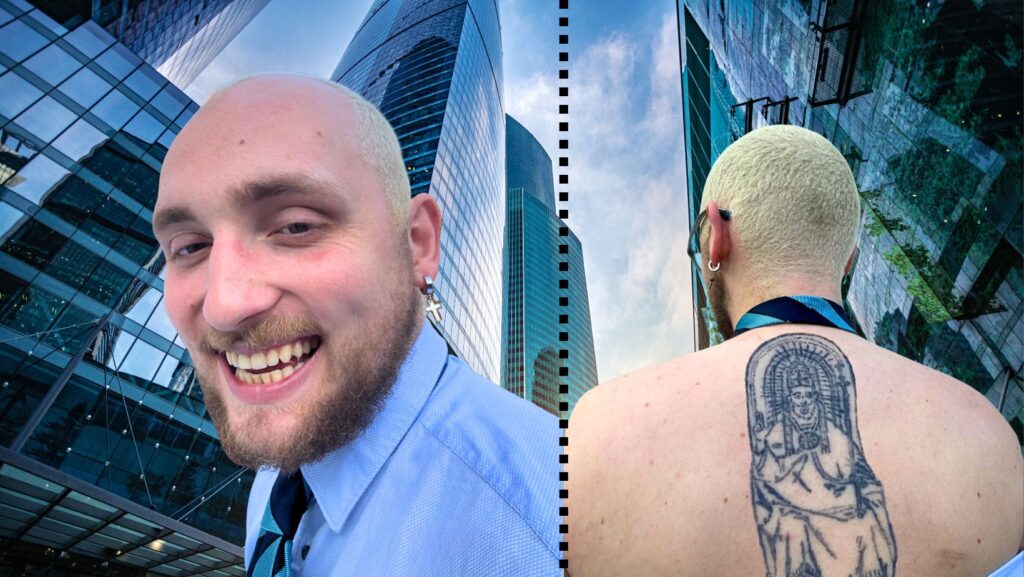Alex Hicks, a 24-year-old political analyst, walks to work wearing a smart grey suit, shiny leather shoes, and an enormous tattoo of Jesus consuming his entire back. He looks towards the corporate office where he will spend the next nine hours, and sighs at the prospect of spending another day being someone he is not. In sharp contrast, Rose Butler, a 22-year-old student, rolls out of her bed in Bristol and stretches, lifting her heavily tattooed arms above her head. She gets dressed, applies dark makeup all around her eyes and flings her leather satchel over her shoulder before heading to university to study interior design.
Rose wanted to study economics, but the corporate world with its conservative dress code and expectation of plain skin refused to embrace her. Her skin became a barrier, a mark of non-conformity that would separate her from the corporate career path she had initially chosen. In Alex’s case, he has to conceal and change himself to fit into that world.
“I will walk into client meetings and can just see people’s eyes looking straight to the top of my head”
As well as the new YouGov data, last year, Virgin Atlantic became the first UK airline to allow cabin crew to display tattoos, and across the UK, police forces have increasingly been allowing officers to display body art. Even Indeed updated its advice earlier this year to say “employees with tattoos have become more prominent in workplaces”. Senior figures in both business and politics are also now known to have tattoos, including Canadian Prime Minister Justin Trudeau and Lachlan Murdoch, executive co-chairman of News Corp.
This new-found acceptance of body art within the working world is yet to be fully absorbed by the business and finance sectors, but its leaders’ attitudes are starting to shift. Paula Fallowfield, head of HR at Louis Vuitton Moet Hennessy, says there is an increasing desire for self-expression in the workplace. “Corporate leaders must recognise that a diverse and expressive team serves society better” and leaders are learning how expressionism can “enrich the corporate conversation,” she says.
Paula, who has worked in HR for almost 30 years, highlighted the significance of body markings and piercings in certain cultures and societies, and the rich heritage and stories they carry. She said discriminating against these is “incredibly narrow minded”. But to get these people in positions where they can “enrich the corporate conversation” is tricky, impossible according to Rose.
Alex shaves his hair due to psoriasis as well as self-expression and says his expressive body art, piercings or hair in no way challenges anything. “I will walk into client meetings and can just see people’s eyes looking straight to the top of my head,” he says.
To get his job as a political analyst, Alex had to revert to his original hair colour and remove all of his piercings. “I started applying for jobs as soon as I left university. I was having no luck; the minute I got to a face-to-face interview I would be turned down. My mum told me to try changing my hair, taking out my earring and nose piercing. She said that these kinds of things put employers off,” he says. “Of course she was right,” he laughs. “I think two interviews later I was offered a job.”
Rose had a similar experience during an interview for an internship in a daunting Canary Wharf office. “I remember feeling really uncomfortable with a strong sense of imposter syndrome. I initially went in wearing a blazer over my shirt, but due to feeling really hot and flustered I took it off, revealing my tattoos.” Everyone’s eyes darted to her arms. “They looked at me as if to say, ‘she’s brave’. I ended up feeling embarrassed more than anything; embarrassed about who I am and questioning everything,” she says.
Paula acknowledges the acceptability of tattoos in corporate workplaces is an “uphill battle,” but said people have done it, giving the example of the “absolutely covered in tattoos” creative director of Belvedere Vodka, Mark Foster. “He has opened the conversation up to show how our brands can be transgressive and defy the conservative norm whilst maintaining class,” she says. “If these people have something to offer, there will always be a place for them in any business.”
Alex and Rose’s stories serve as a powerful reminder of the price one pays for acceptance in the white collar workplace. Their experiences highlight the profound impact of rigid expectations and conservative norms on individuals seeking fulfilment within their careers. Ultimately, they should prompt us to question, as Paula and other business leaders are doing, the prevailing notion that conformity is synonymous with success. It calls for a paradigm shift where employers and institutions recognise the value of embracing individuality, creativity, and the diverse narratives of our skin that make us who we are.
Picture: Alex Hicks

